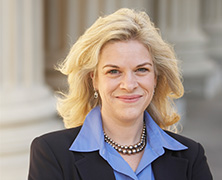L-3 Communications’ SVP Has a Passion for National Security
Lexi Alexander’s passion for the national security mission has deep roots. During the Clinton administration, Lexi worked with the US Department of Defense, State Department, and allied embassies around the world on the first training and communication plans for US Special Operations Forces and their counterparts around the globe. The object was to ensure that these nations had adequate capabilities and communication lines for future operations.
Lexi was responsible for writing the transition plan for counterterrorism senior leaders and related operational policy during the change from the Clinton to the Bush administration. The plan became the baseline for action during 9/11 and is still in use under the Obama administration. She also managed all aspects of federal chemical/biological tabletop and functional field exercises in more than 20 cities across 12 states.
A leadership style best described as “grace under fire,” along with an approachable personality and great expertise in the realm of US government and global affairs, has won Lexi the trust of her colleagues, her 120 subordinates, and her customers.
“Women in leadership must have grit,” said Lexi. “You can’t be afraid to fail. Fight for what you believe in or for an opportunity to achieve something of significance.”
Lexi has been a very active member of the Junior League for years, with particular time and attention paid to the Battered Women’s Shelter in Washington, DC. She led L-3 NSS to officially participate in its first fundraising walk for the homeless shelter in Reston, Virginia, garnering the support and participation of more than 250 employees from across all business sectors and enabling organizations.
Lexi holds a master’s degree in defense policy analysis and counterterrorism from George Washington University.
The most important quality a woman leader should have is…
…courageous…with a good sense of humor
The career advice I’d give my former self:
Learn the art of persuasion.
The one thing I’d do differently in my career, knowing what I know now, is…
Every career is filled with moments that we wish we could have done differently, I think. While it is tempting to look back and say, ‘I could have or should have,’ you make decisions based on what you know at that time. However, the main thing I would do differently is read more. I wish I had spent a little more time simply reading and learning everything I could about my business.
When I really need to focus on a project, I…
…work from home, clearing myself of all distractions
My biggest career leap (and what I learned from it) was…
…going to work with the Institute for Defense Analyses (IDA), a not-for-profit, Federally Funded Research and Development Center (FFRDC). It was at IDA that I first began working with the military, and specifically, the Special Operations community, which ultimately fostered my career working in the field of counterterrorism with the Department of Defense.
Being a woman in my profession has been…
…exciting. It has been a true honor to work knowing that what I do every day ultimately supports the warfighter’s success.
I’ve learned that failure is…
…a part of risk; failure often goes hand-in-hand with success. Women in leadership must have grit. Don’t be afraid to fail. Fight for what you believe in or for an opportunity to achieve something of significance.
I maintain a healthy personal life by…
…by spending quality time with my husband and daughter.
I knew my present career was what I wanted to do when…
…I won my first multi-million dollar deal. I was sold.







